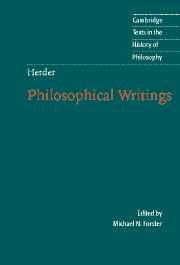Book contents
- Frontmatter
- Contents
- Introduction
- Chronology
- Further reading
- Note on the texts and translation
- Part I General Philosophical Program
- Part II Philosophy of Language
- Fragments on Recent German Literature (1767–8) [excerpts on language]
- Treatise on the Origin of Language (1772)
- Part III Philosophy of Mind
- Part IV Philosophy of History
- Part V Political Philosophy
- Index
- Cambridge texts in the history of philosophy
Treatise on the Origin of Language (1772)
Published online by Cambridge University Press: 05 June 2012
- Frontmatter
- Contents
- Introduction
- Chronology
- Further reading
- Note on the texts and translation
- Part I General Philosophical Program
- Part II Philosophy of Language
- Fragments on Recent German Literature (1767–8) [excerpts on language]
- Treatise on the Origin of Language (1772)
- Part III Philosophy of Mind
- Part IV Philosophy of History
- Part V Political Philosophy
- Index
- Cambridge texts in the history of philosophy
Summary
Vocabula sunt notae rerum.
CiceroFirst part: Were human beings, left to their natural abilities, able to invent language for themselves?
First section
Already as an animal, the human being has language. All violent sensations of his body, and the most violent of the violent, the painful ones, and all strong passions of his soul immediately express themselves in cries, in sounds, in wild, unarticulated noises. A suffering animal, as much as the hero Philoctetes, when overcome with pain, will whine!, will groan!, even if it were abandoned, on a desolate island, without the sight, the trace, or the hope of a helpful fellow creature. It is as though it breathed more freely by giving vent to its burning, frightened breath; it is as though it moaned away a part of its pain, and at least drew into itself from the empty atmosphere new forces for getting over its pain, by filling the deaf winds with groaning. This is how little nature has created us as isolated rocks, as egoistic monads! Even the finest instrument strings of animal feeling (I have to use this metaphor because I know no better for the mechanism of feeling bodies!) – even these strings, whose sound and straining does not come from volition and slow deliberation at all, indeed whose nature all of investigating reason has not yet been able to bring to light through investigation, even these are directed in their whole play, even without the consciousness of foreign sympathy, at an expression to other creatures.
- Type
- Chapter
- Information
- Herder: Philosophical Writings , pp. 65 - 164Publisher: Cambridge University PressPrint publication year: 2002
- 23
- Cited by

